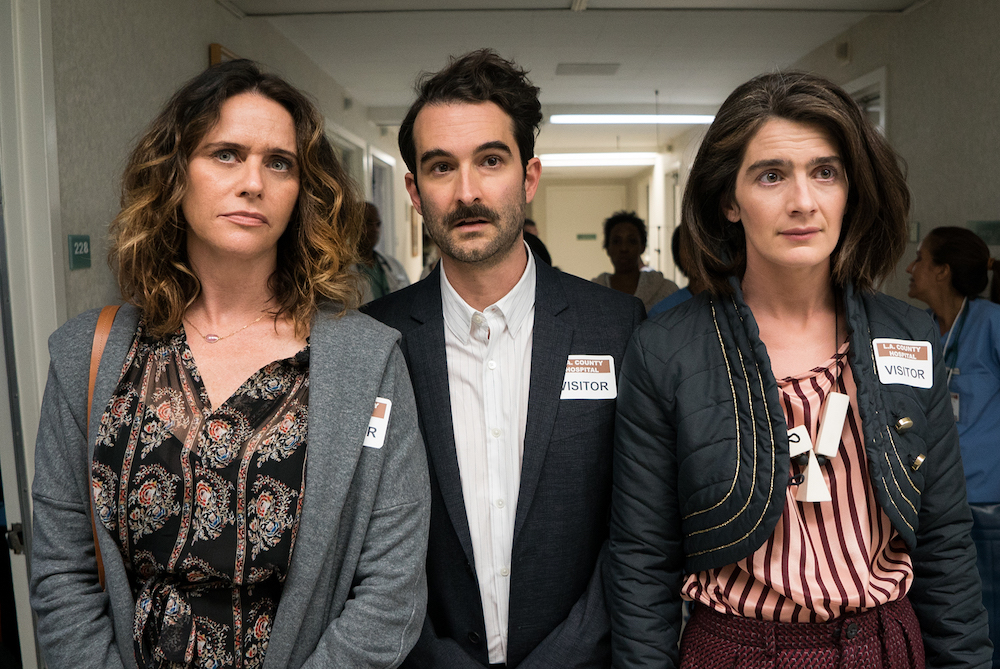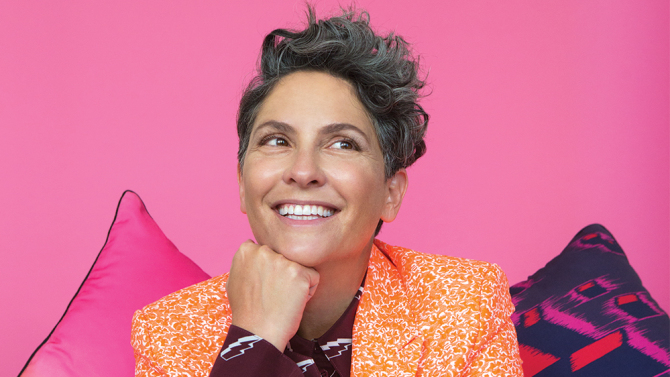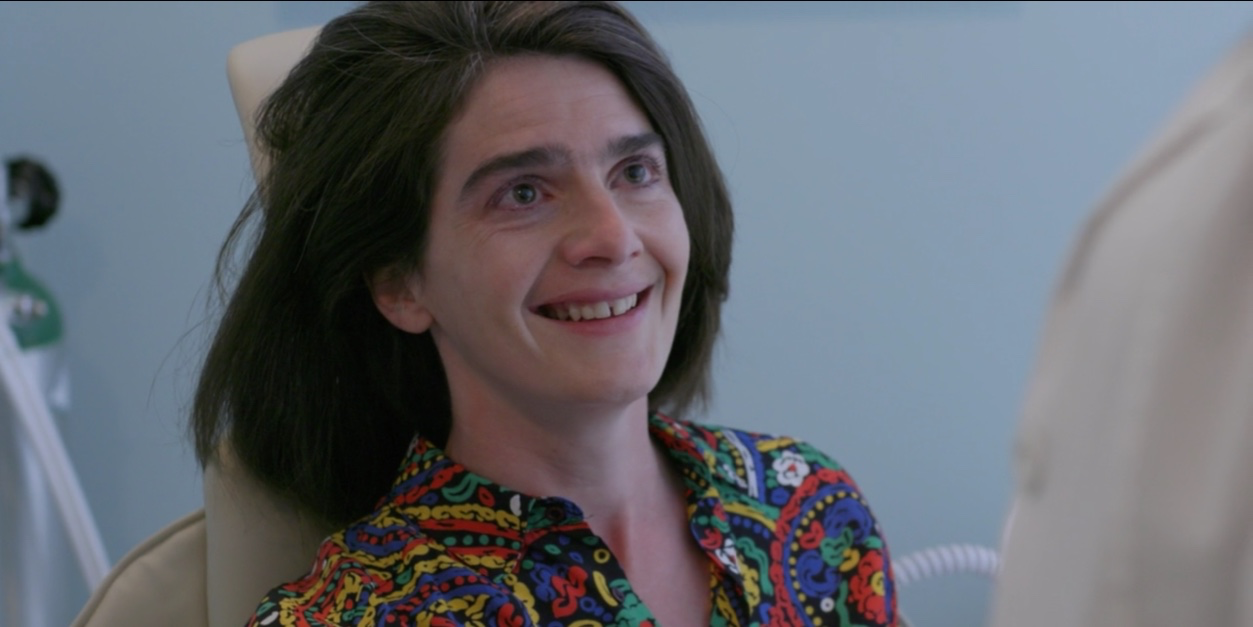TRANSPARENT Season Three Review

The third season of TRANSPARENT feels like a five-hour indie film. The creator and showrunner described this season as the beginning of the second act of a much larger narrative, and this small part of the vast story Ms. Soloway is weaving delivers big time. It’s the kind of story that should be told, but rarely ever is. The idea of a show this raw, this real, that presses as many hot buttons as it does, would send most networks running. Even after three seasons, it still feels like a small miracle TRANSPARENT came to fruition at all.
TRANSPARENT originally centered around Maura (Jeffrey Tambor), the former patriarch of an LA Jewish family who transitions to a woman. Three seasons later, the reverberations are still rippling through her family, including her eldest daughter Sarah (Amy Landecker), son Josh (Jay Duplass), and youngest Ali (Gaby Hoffmann), as well as her ex-wife Shelly (the riveting Judith Light)—the premise has evolved to showcase a talented ensemble cast.
TRANSPARENT isn’t a show for everyone. It doesn’t pack punches, rather taking its time to unravel. The dreary, overly industrialized Los Angeles landscapes are woven into the story, informing an emotional atmosphere that sticks to us just as it does to its polarizing cast of characters. These characters are brought to our field of focus slowly, on their own terms. The camera gets fearlessly close, in a style that would be uncomfortable if it were left in less capable hands. Instead, the narrative is opened, as these pained, oft-searching faces are left unvarnished and become ours to know. It’s the kind of story that lingers, at times perhaps too much, but always in its pursuit of truth.

Jill Soloway knows she’s a genius
This season, TRANSPARENT explores feelings that are difficult to place: a restlessness, a disquieted longing for something that one cannot quite understand. In the first episode of the season, Maura questions why she is so unhappy despite the fact that she has everything she’s ever wanted; she’s transitioned, her family accepts her, and she’s in a new relationship, yet something is still missing. That is true for all of the Pfefferman clan this year; they are all searching for what they think will make their lives complete.
Shelly is fueled with a renewed sense of purpose. She throws herself into her new relationship with Buzz, silencing any voice that tries to tell her he’s anything less than perfect. She also develops her one-woman show in a storyline that both showcases Judith Light’s acting (and singing) chops and layers a character that felt pigeonholed in previous seasons. Her performance in the final scene of the season is dazzling and as close to perfection as it can get.
Maura’s arc this season is much quieter and pervades at the corners of hopelessness as she discovers how surgically limited her options are as a transgender woman her age. She seems as lost as ever this season as her discomfort and dissonance from her own body are brought into the forefront. It’s a painful storyline that shades Maura with greater depth. If in the first season she seemed too perfect, now she’s as flawed as the rest of her family. Her frustration colors her relationship to Vicky (Anjelica Huston) with a marked selfishness, as her need to be the center of attention is highlighted, while her strained relationship with her sister continues to be extremely toxic. However, Maura remains one of the most sympathetic characters, because it is impossible to forget just how hard she has to fight just to be herself.
Meanwhile, Josh and Ali foster an unhealthy codependent bond as they live together in their childhood home. Josh is still reeling from the loss of his biological son, Colton, and his fiance Raquel, while Ali is, as always, fumbling in her search for self-discovery. Her teaching post seems to have given her a new sense of purpose and a stylish new wardrobe, but the fun ends there. For, in a twist that everyone saw coming, her new relationship with Leslie quickly shows its cracks. (Remember Leslie, the older professor with predatory vibes for whom Ali left Syd, her best friend/girlfriend/arguably only genuinely kind person on the show for?) They both feel at a loss, and look to each other to fill the void in their lives.
Sarah is also trying to ameliorate the life she blew up back in season one. In a new modern family-style of arrangement that lacks serious boundaries, Len and Sarah are now living together again for the sake of their kids—or at least that’s what they’re telling themselves. Their reconfigured relationship is as warm as it is uncomfortable, as they lie in the in-between, neither married nor exactly apart. As they inch their way back together, it’s unclear whether or not it’s for the best, but it’s a welcome change to see tenderness in a relationship that was defined by acrimony for so long.

I swear they’re divorced
Image Source: Screenshot of TRANSPARENT
Meanwhile, Sarah’s relationship with Rabbi Raquel is one of the season’s strongest storylines. Kathryn Hahn is one of the finest actresses of our generation; her entire being is a vehicle for story, as a thousand emotions ripple across her face in a moment. So to see Rabbi Raquel, who is in many ways the emotional heart of the show, have her faith shaken to the core is devastating. But this is exactly what makes TRANSPARENT so great, as even the most steady among us have their reckoning. Everyone is doomed to change.
The Pfeffermans have been been criticized for being selfish, and they absolutely are, but that is also what makes them great characters. For, as Shelly puts it, “When one person in a family transitions, everybody transitions.” The Pfeffermans are transitioning, trying to become more than what they once were. Self-discovery is seldom an easy process, and it comes with a kind of selfishness, as it is hard to look beyond oneself to see others when you are wrapped up in your eternal conflict. But they are slowly and painfully awakening.

“I just saw God” – Ali at the dentist
As with any piece of art, there are bound to be some missteps. The first episode feels like a direct response to the criticism aimed at Ms. Soloway for not including the struggles of trans women of color. It’s a jarring, rather forced addition to a season that otherwise flows seamlessly, especially since Elizah’s story is never revisited. On the other hand, Caitlyn Jenner’s bizarre cameo plays as an unnecessary publicity stunt more than anything else, and some of the stellar supporting cast members from the first seasons were sorely missed (Tammy and Syd, please feel free to come back anytime).
Yet these small critiques pale in comparison to the sheer artistic scope that is TRANSPARENT. The dialogue is so real and honest, it hums with truth. The characters are complex, deeply flawed people who are much more than their identities lesser shows would not hesitate to define them by. After three seasons it has only become better. Jill Soloway is a master storyteller, and the cast contains some of the most talented and underrated actors in the industry. TRANSPARENT is a beautiful show that is both ahead of its time and will stand the test of time, of that I am certain. I couldn’t recommend it more.
Verdict: Recommend




I didn’t really have a desire to see this show, as I had no idea what it was about. Thank you April for so movingly describing the show and what I can expect. “When one person in a family transitions, everyone transitions.” That’s life. Well, that is, if you’re paying attention.